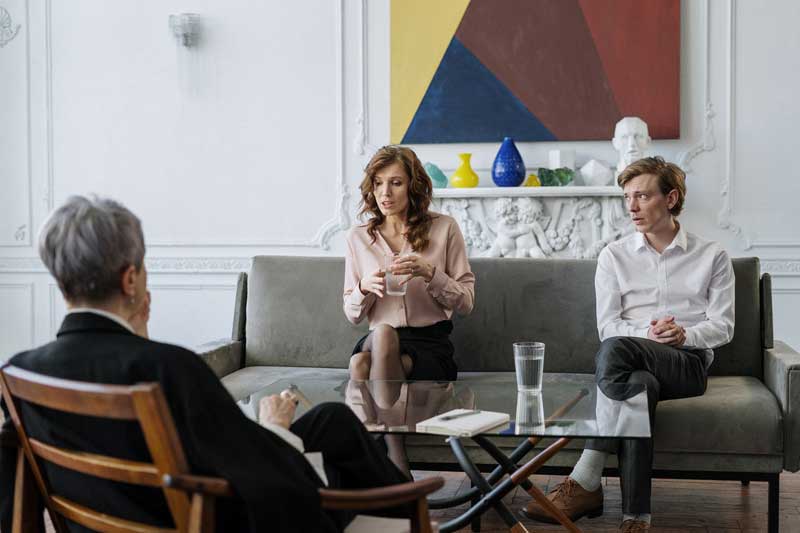Case study couple coaching


A couple, Ankita and Mohit [names have been changed], came to me for their third session. They had been having many fights. Their goal was to come closer to each other, get to know each other better and improve their relationship.
Whenever I take up a new couple for sessions, I tell them this up front: “Nobody is here to prove the other person wrong. I am not fixing anyone either. I am here to help you both understand each other much better, translate sometimes and direct you, if needed. I need you to do the homework that I request you to do. Last but not the least, I will not be taking sides because I am on both your sides.”
I start the sessions only after I clarify these points.
Here is an insight into Ankita and Mohit’s third session:
At the beginning of the session, I asked both Ankita and Mohit the same question: “How has it been since the last session?” Both reported that they had some good experiences.
I asked them individually: “Thank’s wonderful, and how did you do it?”
This question is to make them reflect on their skills, as in the skill they used to make the relationship successful.
Ankita said, “I kept my cool during a situation I would normally have lost it. So the conversation continued and we were able to come to a conclusion.” I prodded her for details. So she continued, “Well, Mohit often wants me to decide where to go for dinner. I put a lot of time and effort, and I give him options. But he rejects everything. Then when I ask him to decide a place, his answer is often, ‘I don’t know; just choose something nice.’ And this is how it has been for some years—I give him option, he rejects, and he has no suggestion either. Then he becomes upset with me for not finding a good restaurant for us. But since our last session, I did something different. I told him he could choose a place and we could go, whichever place he can come up with. Again, as usual, he said, ‘I don’t know.’ I replied, ‘Me neither. Let’s just stay at home then.’ Mohit seemed very lost and turned away. He was upset about the whole thing and didn’t talk to me for several hours. He gave me the silent treatment. But I was okay with it… At night, however, he came to me and suggested that we go to the restaurant near our house. I agreed and we went.”
I noticed Ankita had made some progress. “All right, Ankita. Mohit, your turn now. How did you do it?”
Mohit said, “Yes, I rembered that the restaurant was quite nice the other day, and I thought why not go there. So it was easy to decide. About the changes I made in the last 1 week, I made some modifications to my routine with regard to smoking. I have also started working out in the gym.”
“Mohit, that that is great. But how is it relevant in the relationship?” I could see that the couple still had some disconnect. We gradually came to the topic that they were both missing some cues from one another.
Ankita still had several complaints about Mohit.
“I want him to pay attention to me and be sensitive toward me. For example, even after knowing that I am allergic to paint, he insisted that I sleep in a freshly painted room. I find this very insensitive and I feel that he doesn’t care about me.”
Mohit, on the other hand, complained, “She is very rude and shouts sometimes, especially when she gets upset. It is not so nice of her.”
I asked him, “Mohit, can you be more expressive and share what you feel when she is angry and shouts at you?” I intentionally asked him this because I know from his one-on-one sessions with me that her outbursts irritate and upset him tremendously. [I do this with every couple. There are couple sessions as well as in one-on-one sessions with me during that time.] However, Mohit wasn’t able to express what was really going on. I call this a missed chance of being vulnerable in front of the other person and to show who you are and what moves you.
So I asked them what is their love language (or how they expressed) and way of appreciation. Usually both parties have different ways to show their love. Some people (e.g., mothers) cook something delicious food when they want to express their love and fondness for someone. Some people hug, some gift things to the other person, etc.
Everyone has a different way of expressing love, and most often, it is not the same as the other person. Thus, this expression is often misunderstood and expectations (or the need to receive love in the same way one gives love) go unmet. Because of this not knowing or ignorance and the consequential feeling of being unloved, many couples break up.
So back to Ankita and Mohit. I asked each of them this question: Is your partner’s method of expression the way you prefer it or do you need to translate into your partner’s language?
Ankita said, “I don’t know…. But I feel disconnected from Mohit.”
Mohit’s response was, “It could be because I am not talkative.”
I then asked Mohit, “What do you think makes you feel connected to Ankita?” “I don’t know. I have never really thought about it.”
So it is quite evident that everyone needs time to process and become aware of how they are connected to the other. In the session, I initiated that thought process with Mohit. But I asked him further, “can you remember a time when you felt very connected to Ankita?”
He replied “yes, I actually do. It’s a while ago, when we met each other for the second date. We smoked and drove around, listened to music and enjoyed the time together.” “So was it about doing somethings together, Mohit?” “Yes, exactly. We just holded each others hands and did some things together”.
“here we go, very well Mohit. Ankita, did you ever knew that Mohit feel connected in that way?” “He never told me, …. So, no I didn’t know” was Ankitas reply.
“And what about you Ankita, when do you feel connected to Mohit?” I also never thought about it, …” she paused for a little while, then continued “I felt connected with him when we spoke about my work, he listens to me and gave me some suggestions. I was very connected with him at that time!”
“Okay great, that’s something”, I appreciated them.
“So Mohit is already aware of Ankitas way of understanding her language- through attentive talks. You mentioned that she might feel not connected because you aren’t talkative. And she just confirmed that she feels connected with you when you both are talking.”
Mohit nodded, and so did Ankita.
“So Ankita, you now know that Mohit feels connected with you when both of you are doing something together, some activity – that means you both have different langauges and ways of connecting to the other person. So you might know now what you can do when you feel a disconnect. You juts use the way the other person feels connected. It is like giving what the other person needs.”
“That is actually a very good idea,” Mohit commented.
Both agreed that they want to try that option out.
We also spoke about the expression of love. Both had a different way: Mohit physically expressed his love towards her, no words but gestures, petting her neck for example. Ankita on the other hand expressed her affection towards him with care –doing things for him, like finding out a good restaurant for both of them [that’s why she was so angry and upset as he put often her suggestions done without any other option, so she feels that her love is rejected whenever he puts down her ideas].
At the end of each session both partners agree for some homework (as I call it).
Ankita’s task:
- Keep in mind that Mohit’s way of expressing love is different from mine.
- Be attentive toward Mohit’s needs and realize that his needs are different from mine.
- Keep my cool.
Mohit’s task:
- Observe myself and how I express my affection toward Ankita
- Be aware of Ankita’s love language and ways of connecting with and to me
- Be mindful of those that are working for her.
To both Ankita and Mohit:
- Be playful in your approach.
- Be aware of the attempt the other person is making.
- Keep appreciating the other person for the same (above).
- Practise receiving.
- Try out and observe the other’s response.
Get some experiences, and be aware – it wont be in your comfortzone!
Both agreed, Ankita sensed some hope and at the end of the session, Ankita and Mohit gave me their takeaways.
Mohit’s big takeaway: I have never thought about nor was I aware that other people have different ways to express their love and feeling due to different reasons connected. I definitely want to think about the feeling of connection I have with my wife.”
Ankita said, “I want to pay attention to my way of expressing, and I want to share with Mohit more about how I express my love and when I feel connected with him- I will tell him then.”
Happy care taking, Jasmin Waldmann
Check out this video and share it with your friends:
“If You Feel You Aren’t Good Enough Watch This – episode 1”
Jasmin Waldmann is a well renowned international Life Coach. She guides people of any age, occupations, gender or nationality to work on their charisma, inner balance, guide how to become more successful and boost mental and physical health – and this counts for business and private life. Jasmin helps in a team-character way to a life full of joy and satisfaction.
Share your feedback, questions, experiences and suggestions to office@jasminwaldmann.com and read more articles here: www.jasminwaldmann.com/blog

Comments